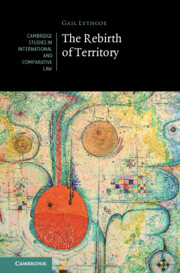‘Building on debates in geography and social theory, Gail Lythgoe provides a powerful reorientation for our understanding of territory in the 21st century. A fundamental challenge to international law, the importance of this book for our contemporary moment means it deserves an audience far beyond; a crucial contribution to the debates from which it takes its inspiration.’
Stuart Elden - Professor of Political Theory and Geography, University of Warwick
‘Since modern thought grounded the human self on earth, territorialising has been a central mode of thinking. International law has been no exception to that. Gail Lythgoe, in her groundbreaking intervention, comes to show how some spaces are recognised and others are made invisible by the territorialising thinking of international lawyers, inviting us to reinvent international legal geographies.’
‘The Rebirth of Territory invites us to rethink one of international law’s defining concepts. Gail Lythgoe transcends the often stale debates about 'title' and alleged 'ends of geography’. She shows that territory never goes away and yet is always socially constructed - and in so doing, greatly enriches our geographical imaginary. This is a significant achievement.
Christian J. Tams - Chair of International Law, University of Glasgow. Director, Glasgow Centre for International Law and Security
‘Lythgoe’s provocative attempt to redefine territory is part of an important movement in political philosophy, geography, and, increasingly, international law. That so many, and so varied, efforts are underway to reconceptualize territory in law and political theory speaks to the importance of this set of ideas, both intellectually and practically. Lythgoe makes a novel contribution to that literature, going where international lawyers have not … The Rebirth of Territory is best read as a challenge, one that opens up new intellectual 'spaces,' and one that you may well find yourself thinking about as you ride the bus to work, tend your garden, or consider international legal arguments.’
Ingrid Brunk
Source: American Journal of International Law



